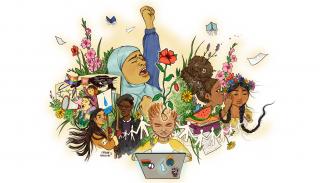
Breadcrumbs navigation
Historicising Countertransference across Terrains of Colonial Trauma: Reimagining Universalism from Below
Colonial trauma provokes interdisciplinary synergies between fields of culture and mental disorder, and legal and political projects concerned with decolonisation, recognition, and reparation. The psychic damage of colonialism implicates violence in transnational, geopolitical and transhistorical relations between the West and its former colonies—in civil wars, migrant deaths, detention camps, and many differentiated freedoms in the present. Many critiques exist of ways colonial genealogies are occluded in the contemporary (Stoler 2022); in patterns of power that endure beyond colonial administrations (Mignolo 2011); in the fiction of the borderline in psychiatric madness (Balibar).
Studies have likewise long criticised interpretations of trauma which foreshorten and short-circuit complex ways terrains of the past are realised in the present—in transgenerational suicide (Stephenson 2014), addiction (Garcia 2010), postcolonial disorders (DelVecchio Good 2008), spiritual despair and collective psychic strife (Pandolfo 2018), or subtler corrosions of environment characterising the biophysical afterlife of slavery (Bruno 2022).
Regarding “colonial trauma”, Karima Lazali’s (2021) topic is the French colonisation of Algeria, and the Algerian civil war. She questions how to address a colonial history which people three generations later did not experience directly, “where parental silence is met with a political blank space”. Lazali highlights the absence of investigations into disappearances, killings, mutilated bodies and dispossessions, and their persistence in the next generations beyond language, knowledge, and circuits of recognition. In this scenario, the clinical encounter offers a burial for homeless bodies.
Building on Lazali’s invitation for ethnography, I prioritise the subjectivity of colonial trauma and its inheritors as a theoretical and methodological stance, as means of burying homeless bodies, filling in blanks, and connecting violent pasts with reparative futures; while retaining the uneven particulars of discordant histories, and their relational formation. Taking Devereux’s (1967) concept of countertransference, I ask: what kinds of reflexivity are entailed by the double-nature of the traumatised subject writing about trauma? I draw from over two decades during which I have analysed war, violence, and intimate traumas across the march and migrations of British empire (involving refugee migrants to Pakistan after Partition, Afghan refugees in England, and more recently asylum seekers in a psychiatric hospital in Paris), without fully comprehending the silenced memory of killings buried in my own family history. These I analysed in my recent book ‘The Breath of Empire’ (2023) which provokes trauma as an interplay of murder connecting imperial war and occupation in British Hong Kong, and domestic wars in the Anglo-Chinese family in England. Here I extend those reflections.
For Devereux, working at the interface of anthropology and psychoanalysis, countertransference refers to the radical subjectivism of experiencing the other’s ‘inside’ by analysing oneself: an analytic relation transposed into the research field that is “the only possible scientific knowledge” and means of knowing the other. A quantum physicist turned ethnologist, trained by Marcel Mauss, Devereux remained an intellectual maverick: ‘Real science’, he writes, ‘is an unwashed urchin perpetually in rebellion and forever questioning even the most firmly established scientific truths’.
Mindful that psychoanalysis has long been criticised as a colonial discipline (Khanna 2003), but also disrupted conditions of violence in settler colonialism (Sheehi and Sheehi 2022), I propose countertransference as one means of making and re-stitching connections between traumatic histories and experiences typically considered distinct. This privileges the subjectivity and emergent knowledge of inheritors of colonial trauma as a means for routing through new sites of absence and recognition. Thinking this conjuncture provokes the question of how we fight together, bringing all our experience to bear in the war of the present. When the usual politics of difference is disoriented, what emerges is an excess of life synthesised into strange propinquities and possibilities of imagining that evoke a new universalism from below.
References cited
Balibar, Etienne. 1990. Fichte et la frontiere interieure: a propos des discours a la nation
allemande. Cahiers de Fontenay 58/59.
Bruno, Tianna. 2022. Online first. ‘Ecological Memory in the Biophysical Afterlife of
Slavery’. Annals of the American Association of Geographers
DOI: 10.1080/24694452.2022.2107985
Devereux George. 1967. From Anxiety to Method in the Behavioral Sciences. Paris: Mouton &
Co.
Garcia, Angela. 2010. The Pastoral Clinic: Addiction and Dispossession along the Rio Grande.
Berkeley: University of California Press.
Khan, Nichola. 2023. The Breath of Empire. Breathing with Historical Trauma in Anglo-Chinese
Relations. Studies in Literary Anthropology. New York: Palgrave.
Khanna, Ranjana. 2003. Dark Continents. Psychoanalysis and Colonialism. Durham NC: Duke
University Press.
Lazali, Karima. 2021. Colonial Trauma. A Study of the Psychic and Political Consequences of
Colonial Oppression in Algeria. Trans. M. B. Smith. Cambridge: Polity Press.
Mignolo, Walter. 2011. The Darker Side of Western Modernity. Global Futures, Decolonial
Options. Durham NC: Duke University Press.
Pandolfo, Stefania. 2018. Knot of the soul. Madness, Psychoanalysis, Islam. Chicago: University
of Chicago Press.
Stephenson, Lisa. 2014. Life Beside Itself: Imagining Care in the Canadian Arctic. Berkeley:
University of California Press.
Stoler, Ann Laura. 2016. Duress. Imperial Durabilities in Our Times. Durham NC: Duke
University Press.
Sheehi, Lara, and Stephen Sheehi. 2022. Psychoanalysis Under Occupation: Practicing
Resistance in Palestine. New York: Routledge.
Nichola Khan is Professor of Human Geography and Ethnography. She works at the interface of migration, violence, and mental/health in conflict, post-conflict, and 'post'colonial societies: specifically, using ethnography to research urban violence among Pakistan’s Urdu-speaking migrant communities in the megacity of Karachi, transnational refugee migration from Afghanistan, and more recently asylum seekers receiving hospital-based medical and psychiatric care in Paris. Nichola's full bio can be found here.